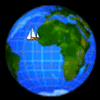Richard Konkolski - Knihy Konkolski s.r.o.
|
| DOMŮ |
|
|
FILMY-DVD | TELEVIZE | ROZHLAS | ČLÁNKY | SEDM MOŘÍ | SÓLO SAILING |
|
|
|
|
||
Vikings DiscoveryWhile Tropical America is separated from Europe and Africa by a vast tract of intervening ocean, and even the advanced posts of the Azores and Cape de Verde Islands are far distant from the western shores of the Atlantic, Iceland and Greenland appear to us in the north as stations linking at comparatively easy distances the Old World and the New. It is therefore not surprising that the discovery of Iceland by the Norwegian Viking or pirate Nadod, and the somewhat later colonisation of the island by Ingolf, in the year 875, should in the following century have led the Norsemen to the discovery of America. Discovery of Greenland by Gunnbjorn Bjorne Herjulfson Leif The fertility and mild climate of this coast, when compared with that of Labrador and Greenland, induced the discoverers to settle, and to found the first European colony on the American continent. Frequent wars with the Eskimos or Skrelingers (dwarfs), who at that time extended far more to the south than at present, soon however destroyed the colony. The last account of Norman America we find in the old Scandinavian records is the mention of a ship which, in the year 1347, had sailed from Greenland to Markland (Nova Scotia) to gather wood, and was driven by a storm to Stamfjord on the west coast of Iceland. About this time also the colonies in Greenland, which until then had enjoyed a tolerable phase of prosperity, decayed and ultimately perished because of wars with the aborigines, and above all of the black death during years of 1347-1351. That horrible plague of the fourteenth century, which, after having depopulated Europe, vented its fury even upon those remote wilds. The knowledge of the Norman discovery of America gradually faded from the memory of man, and also the names and deeds of Leif and Bjorne Herjulfson remained totally unknown to the southern navigators, who at that time had little intercourse with the nations of Northern Europe. John Vaz Cortereal Back to Maritime Discovery |
||||||||||||||||||||||||
|
||||||||||||||||||||||||


